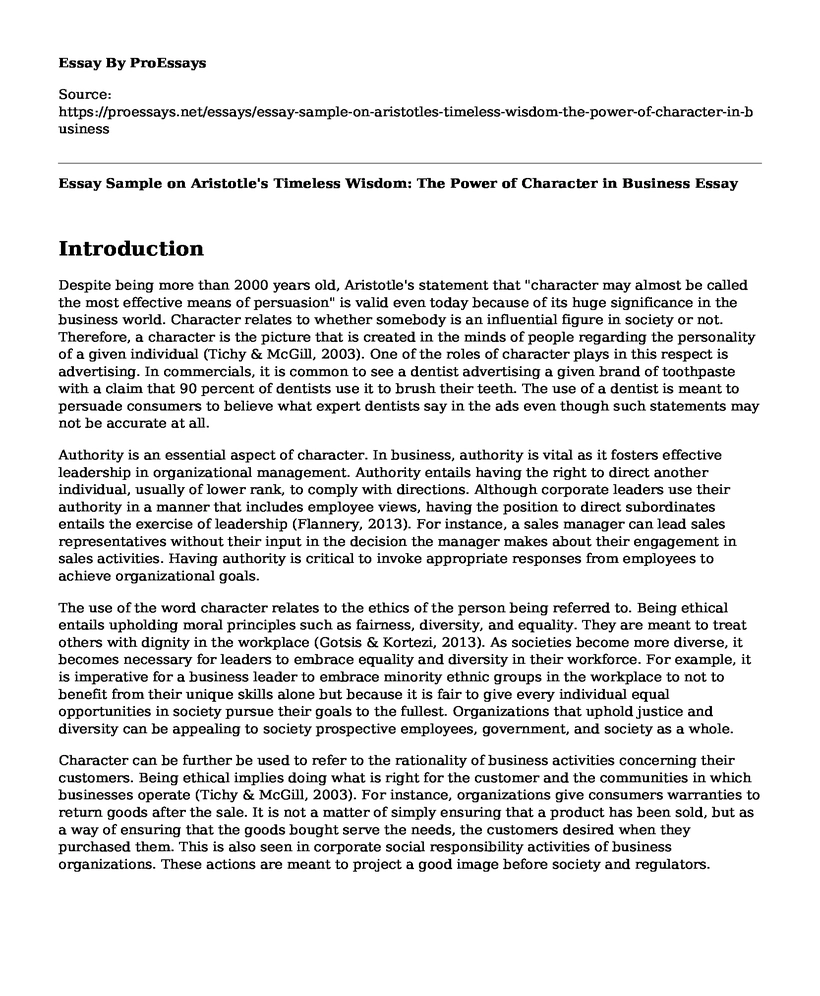Introduction
Despite being more than 2000 years old, Aristotle's statement that "character may almost be called the most effective means of persuasion" is valid even today because of its huge significance in the business world. Character relates to whether somebody is an influential figure in society or not. Therefore, a character is the picture that is created in the minds of people regarding the personality of a given individual (Tichy & McGill, 2003). One of the roles of character plays in this respect is advertising. In commercials, it is common to see a dentist advertising a given brand of toothpaste with a claim that 90 percent of dentists use it to brush their teeth. The use of a dentist is meant to persuade consumers to believe what expert dentists say in the ads even though such statements may not be accurate at all.
Authority is an essential aspect of character. In business, authority is vital as it fosters effective leadership in organizational management. Authority entails having the right to direct another individual, usually of lower rank, to comply with directions. Although corporate leaders use their authority in a manner that includes employee views, having the position to direct subordinates entails the exercise of leadership (Flannery, 2013). For instance, a sales manager can lead sales representatives without their input in the decision the manager makes about their engagement in sales activities. Having authority is critical to invoke appropriate responses from employees to achieve organizational goals.
The use of the word character relates to the ethics of the person being referred to. Being ethical entails upholding moral principles such as fairness, diversity, and equality. They are meant to treat others with dignity in the workplace (Gotsis & Kortezi, 2013). As societies become more diverse, it becomes necessary for leaders to embrace equality and diversity in their workforce. For example, it is imperative for a business leader to embrace minority ethnic groups in the workplace to not to benefit from their unique skills alone but because it is fair to give every individual equal opportunities in society pursue their goals to the fullest. Organizations that uphold justice and diversity can be appealing to society prospective employees, government, and society as a whole.
Character can be further be used to refer to the rationality of business activities concerning their customers. Being ethical implies doing what is right for the customer and the communities in which businesses operate (Tichy & McGill, 2003). For instance, organizations give consumers warranties to return goods after the sale. It is not a matter of simply ensuring that a product has been sold, but as a way of ensuring that the goods bought serve the needs, the customers desired when they purchased them. This is also seen in corporate social responsibility activities of business organizations. These actions are meant to project a good image before society and regulators.
References
Flannery, K. L. (2013). Action and character according to Aristotle. Washington, DC: CUA Press.
Gotsis, G., & Kortezi, Z. (2013). Ethical paradigms as potential foundations of diversity management initiatives in business organizations. Journal of Organizational Change Management, 26(6), 948-976. doi:10.1108/jocm-11-2012-0183
Tichy, N. M., & McGill, A. (2003). The ethical challenge: How to lead with unyielding integrity. Hoboken, NJ: John Wiley & Sons.
Cite this page
Essay Sample on Aristotle's Timeless Wisdom: The Power of Character in Business. (2023, Jan 16). Retrieved from https://proessays.net/essays/essay-sample-on-aristotles-timeless-wisdom-the-power-of-character-in-business
If you are the original author of this essay and no longer wish to have it published on the ProEssays website, please click below to request its removal:
- Paper Example: Applicable Law to Electronic Contracts
- How Morality Affects Society?
- Theories and Code of Ethics in Practice Essay
- Essay Example on Exploring Nietzsche's Meaning of Life
- Stakeholder Analysis of Sainsbury
- Plato's Theory of a 'Just State': 3 Components - Essay Sample
- Essay on ENTR 2P91: Learn to Spot and Capitalize on Business Opportunities







